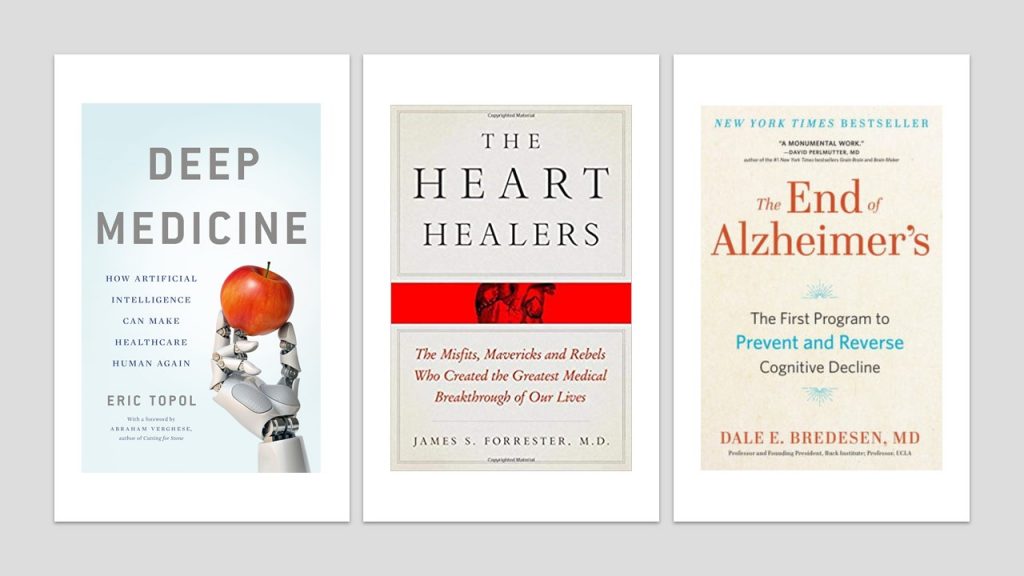At the end of episode 10, Fixing Healthcare co-hosts Dr. Robert Pearl and Jeremy Corr mixed things up a bit. In lieu of sharing listener’s ideas to fix healthcare, Robert and Jeremy shared book suggestions.
Here’s the transcript from the conclusion of episode 10:
Robert Pearl: We’re going to wrap up today’s episode with something new. I recently read and reviewed four excellent books, including Zeev’s. I then asked subscribers to my newsletter, “Monthly Musings on American Healthcare,” to share their favorite medical books. With dozens of suggestions, let’s take a look at three of the books that I think the listeners of this podcast will appreciate.
Robert Pearl: Several newsletter subscribers recommended “Deep Medicine,” the latest release from Eric Topol, a guest of this podcast back in season one. Henry Soch said the book offers a great overview of AI and machine learning along with a balanced conversation about pros and cons of their application in medicine. Anne Nooney recommended “The End of Alzheimer’s” by Dale Bredesen. The book has her contemplating how to best change the model of randomized controlled trials as we enter the era of personalized medicine. Finally, Jeffrey Smith suggests “The Heart Healers” by James Forrester, a cardiologist who offers a detailed history of heart surgery. Jeffrey says the book made him think about how to find better, simpler, and more convenient ways to solve clinical problems.
Robert Pearl: Jeremy, as host of the popular New Books in Medicine podcast, is there a book you would recommend our listeners check out?
Jeremy Corr: Absolutely. Robbie, as you know, I’m a huge history buff, and one of my favorite books of the last couple years has been “The Butchering Art: Joseph Lister’s Quest to Transform the Grisly World of Victorian Medicine” by Dr. Lindsey Fitzharris. This book offers a look into the time before antiseptic or anesthesia when the safest surgeries were performed in the home due to the amount of disease and risk of infection in hospitals. Joseph Lister was a fascinating figure. He’s one of the few people in medical history for whom there was a clear before and after. Thanks to his work, medicine learned that germs were the source of infections and could be countered by cleansing hands and instruments prior to operating.
Jeremy Corr: Doctor Fitzharris is actually going to be the next guest on the Fixing Healthcare podcast. She is a recognized academic expert. She’s been featured on the Joe Rogan Experience podcast, the New Books in Medicine podcast, and many more. We’ll be discussing the history of medicine and the important lessons that can be learned from the past. Listeners won’t want to miss it.
Jeremy Corr: Robbie, I also read your newest Forbes column, which compares the books “Deep Medicine” and “The Butchering Art.” I thought it made a fascinating point about what hasn’t changed in American medicine. Where can readers learn more?
Robert Pearl: Listeners can find the column on Forbes.com. I also included a link to the article in my newsletter, which offers a monthly round-up of the relevant healthcare news, opinion, and research. Listeners can subscribe for free on my website, robertpearlmd.com.
Jeremy Corr: Thanks to everyone who shared their book recommendations with Robbie. Next month, we’ll read listener ideas and suggestions from the Survey to Fix American Healthcare on this show. As always, we invite you to provide your ideas for fixing healthcare at robertpearlmd.com. Thank you for listening to Fixing Healthcare with Doctor Robert Pearl and Jeremy Corr. Have a great day.
READ: Full transcript of Episode 10 with Zeev Neuwirth
* * *
Fixing Healthcare is a co-production of Dr. Robert Pearl and Jeremy Corr. Subscribe to the show via Apple Podcasts or wherever you find podcasts. Join the conversation or suggest a guest by following the show on Twitter and LinkedIn.

